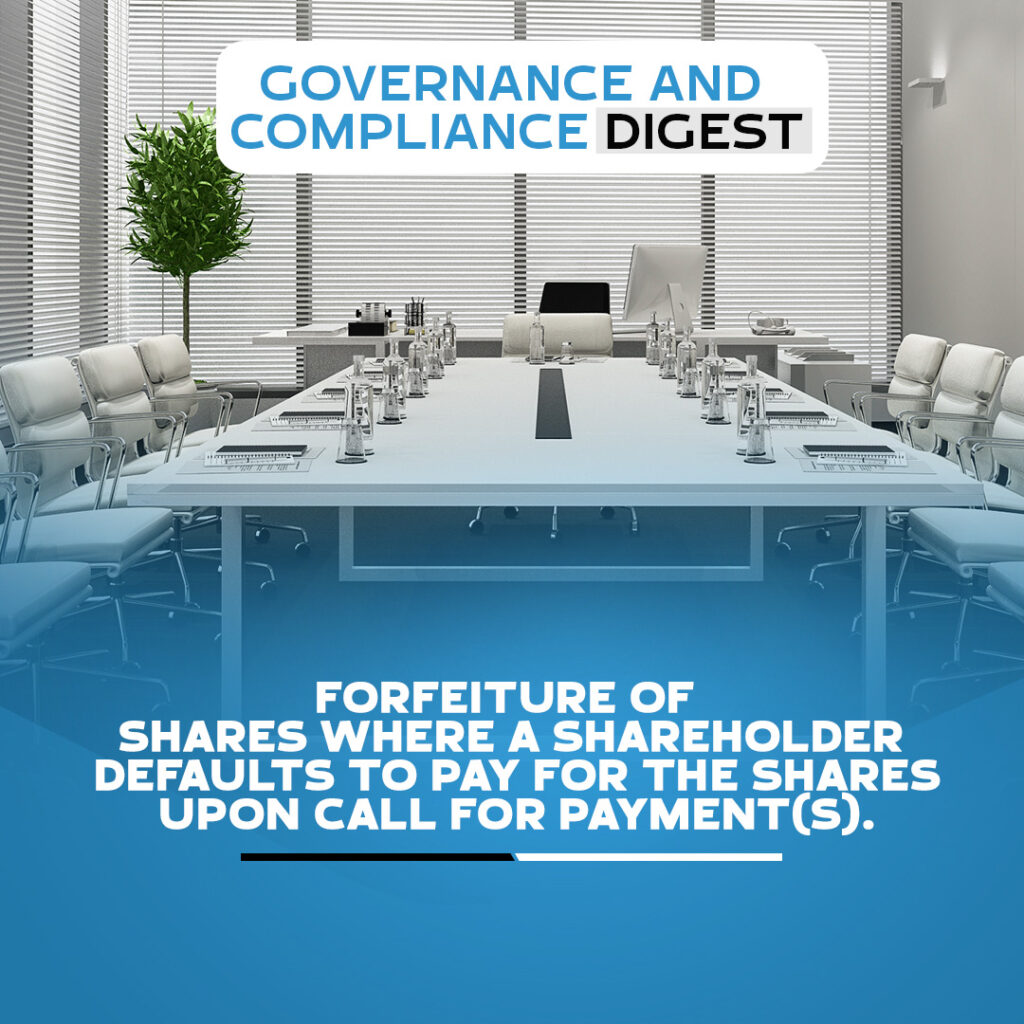A call may be defined as a demand made by the company on its shareholders to pay a part or the whole of the unpaid balance within a specified time. The expression “Call” denotes both the demand for money and also the sum demanded.
A. SHARE FORFEITURE OF SHARES
A company through its directors have the authority to call for payment on shares, and in the event of default in payment at or before the time appointed, the shares in respect of which the call was made are liable to be forfeited. Section 165 (1) and (2) of the Companies and Allied Matters Act 2020 (“CAMA”), provides thus:
- If a member fails to pay any call or instalment of a call on the day appointed for payment, the directors may, thereafter during such time as any part of the call or instalment remains unpaid, serve a notice on him requiring payment of the sum of the call or instalment as is unpaid, together with any interest which may have accrued”.
- The notice shall state a further day (not earlier than the expiration of 14 days from the date of service of the notice) on or before which the payment required by the notice is to be made, and it shall state that in the event of non-payment at or before the time appointed, the shares in respect of which the call was made are liable to be forfeited.
Where a company complies with the provisions of the above Section 165 (1) and (2), a member who fails to pay any call or instalment of a call on the day appointed for payment ceases to be a member the company in respect of the forfeited shares. The company is then mandated to issue a statutory declaration to that effect . Section 165 (6) of CAMA provides thus:
Further to the above, it should be noted that in the case of a deceased shareholder, the shares held by such deceased shareholder of a Company shall transmit to his/her appointed Personal representative. Transmission of shares of a deceased shareholder is addressed under the second issue above.
B. CONDITIONS FOR FORFEITURE OF SHARES:
A company can forfeit its shares only when the following conditions are satisfied:
i. Authority to Forfeit: The power to forfeit must be expressly given in the Articles. Accordingly, if no power is given in the Articles, no forfeiture can be made.
ii. Default in Payment of Calls and Notice to Defaulting Shareholder: The shares can be forfeited only for the non-payment of calls and not for the default in payment of any other debts. The notice shall state a further day (not earlier than the expiration of 14 days from the date of service of the notice) on or before which the payment required by the notice is to be made, and it shall state that in the event of non-payment at or before the time appointed, the shares in respect of which the call was made are liable to be forfeited.
iii. In Accordance with the Articles: Forfeiture shall be valid only when the provisions of the Articles are strictly complied with. Any slight deviation from the provisions may render the forfeiture invalid.
iv. Bonafide and for the Benefit of the Company: The right to forfeit shares is in the nature of trust and so it should be exercised bonafide and only for the benefit of the company without more.
v. Board Resolutions: Forfeiture will be effected only by means of a Board resolution.
C. PROCEDURE OF FORFEITURE OF SHARES
The following procedure must be followed for forfeiture of shares:
i. The list of defaulters i.e., the list of members who have not paid the call money up to the last date is placed before the Board of Directors for necessary action.
ii. The Board of Directors then passes a resolution instructing the Management or Secretary (as the case may be) to send call notices to such defaulters.
iii. As per Board’s resolution, notices are dispatched either personally or by sending it by post to defaulting shareholders or to their registered address, or (if they has no registered address within Nigeria) to the address, supplied by them to the company for the giving of notices asking them to pay the call dues within 14 days with interest at a specified rate.
iv. If any defaulting member does not comply with the requirements of such notice, a second warning notice may be sent stating that if the call money is not received within 14 days from the date of notice, the shares would be deemed forfeited.
v. If this notice also proves ineffective, a meeting of the Board of Directors is convened, and the Board then passes a formal resolution to forfeit the shares. Any of the Directors or Secretary (as the case may be) then proceeds to issue a statutory declaration that the declarant is a Director or the Secretary (as the case may be) of the company, and that a share in the company has been duly forfeited on a date stated in the declarations as a prima facie evidence of the facts stated in it as against all persons claiming to be entitled to the shares.
In final summary, shares are important elements of a company. It represents the interest of a shareholder in a company and as such, due process of forfeiture should always be followed where a member defaults in the payment(s) for his/her shares upon call for the same.
